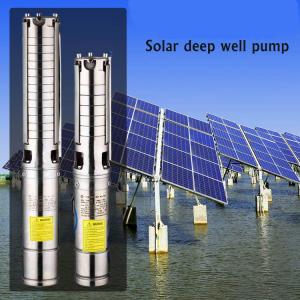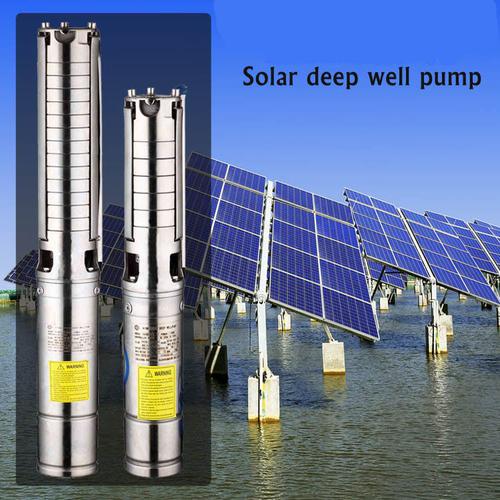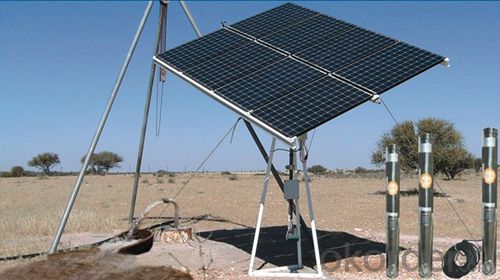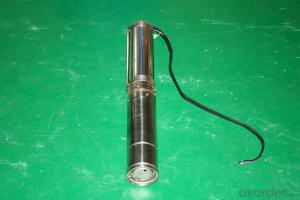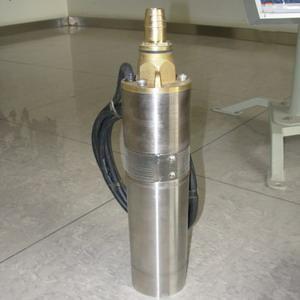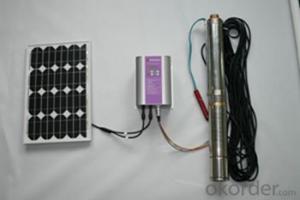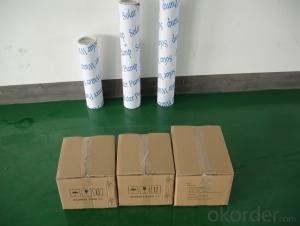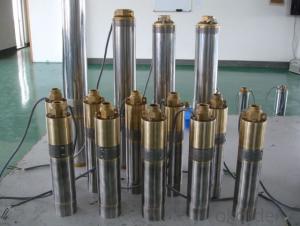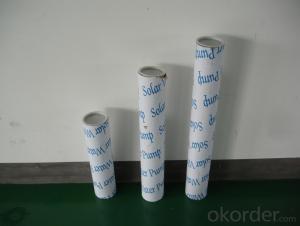Bird Bath Solar Submersible Water Pumps
- Loading Port:
- Shanghai
- Payment Terms:
- TT OR LC
- Min Order Qty:
- 1 set
- Supply Capability:
- 1000 set/month
OKorder Service Pledge
OKorder Financial Service
You Might Also Like
Solar Submersible Pumps Solar Water Pumps
DC solar water pumping system consists of the motor, pump, controller, solar array and some other accessories, such as water level sensor, float switch, etc. Considered that storing water is more efficient than storing electricity, the system is designed to directly drive the pump without battery which can reduce the construction and operating cost and routine maintenance effectively.The PV array consists of multiple solar panels connected in series/parallel, which can supply the whole system as power source by converting the absorbed solar radiation energy to the electrical energy. The pump driven by a brushless DC permanent magnet motor draws water from deep-well or river. The pumped water is then fed into reservoir or water tank, or connected to the irrigation system or fountain system directly.
Advanced Technology
Applications Innovation
The efficiency of DC brushless permanent magnet motor has been increased up to 25% in comparison with traditional asynchronous motor.
Technology Innovation
Stator and rotor are sealed by environment friendly casting resin.Motor insulation resistance can be hold higher than 300MΩfor more than 10 years, which consumedly increased the security and reliability of the submersible motor.
Structure Innovation
Casting resign technology processed stator and rotor as well as the water lubricated bearing make the submersible pump environment friendly.
Feature
High Efficiency & High Reliability
DC Brushless Permanent Magnet Motor
Minimum Maintenance, long Service Life
Environment Friendly Materials, Lubricated Without Oil
Application
Village or Family Water Supply
Animal Drinking Water & Livestock Watering
Garden/Courtyard Irrigation
Swimming Pool
Water Supply for Bivouac or Camping Car
Water Supply for Remote Area
Automatic Control
Operate Automatically, No Need Watching
Maximum Power Point Tracking (MPPT)
Dry-run Protection
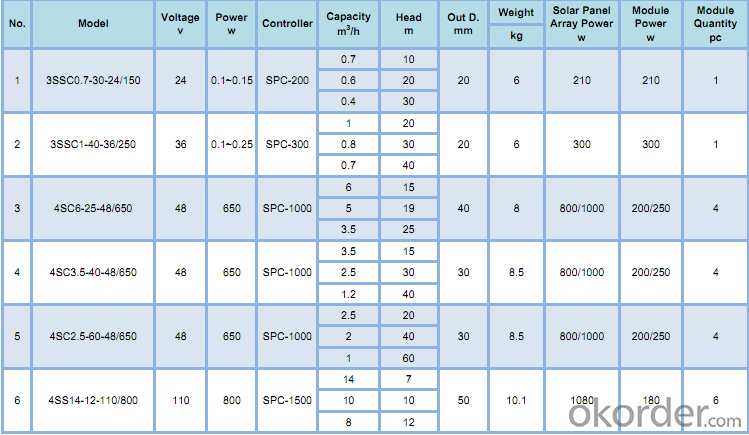
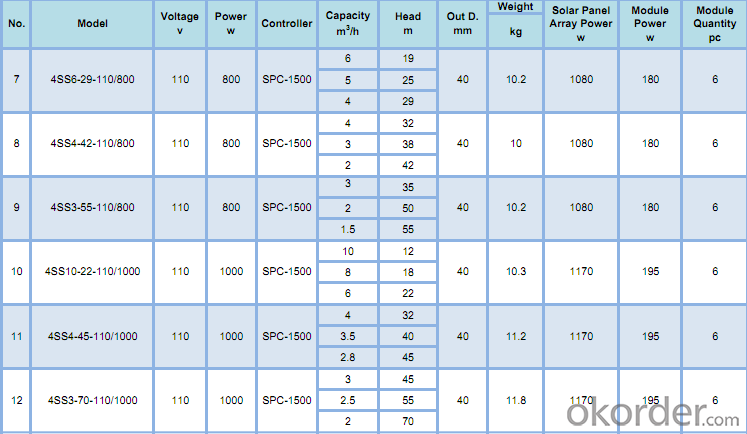
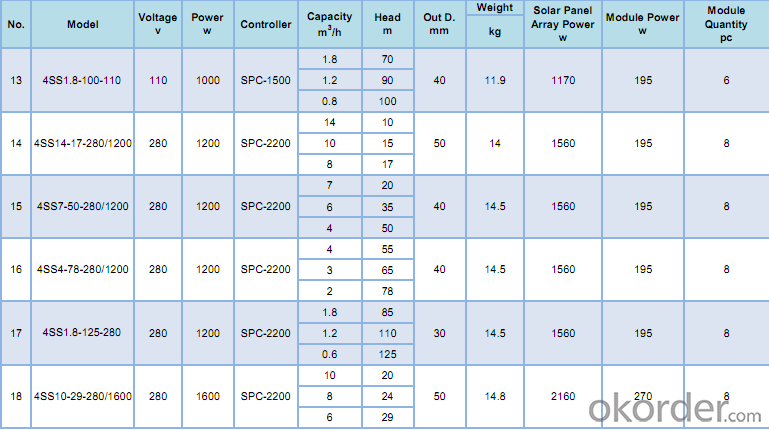
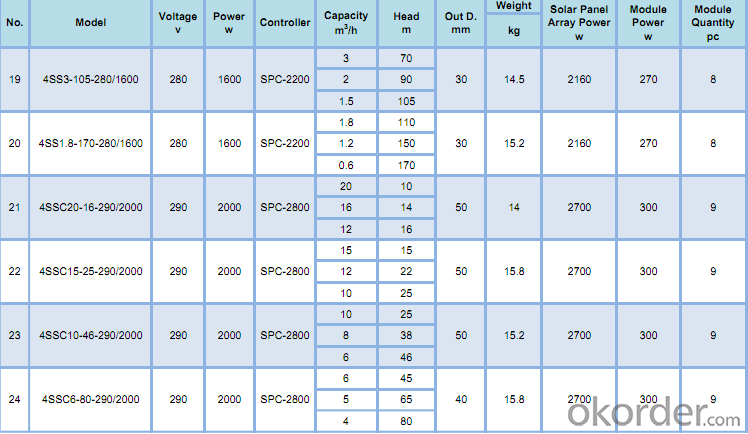
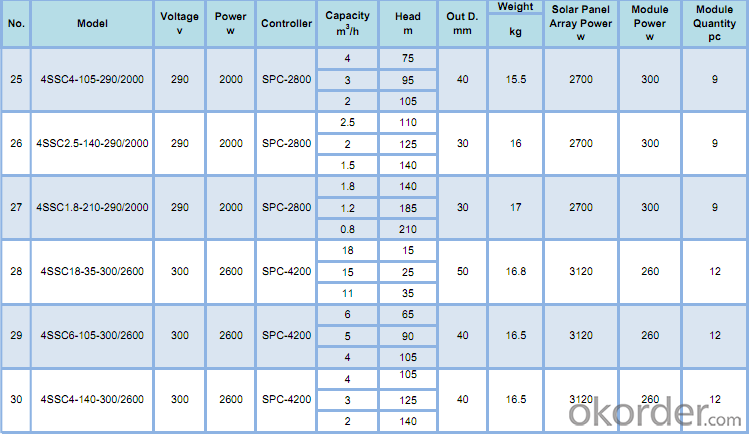
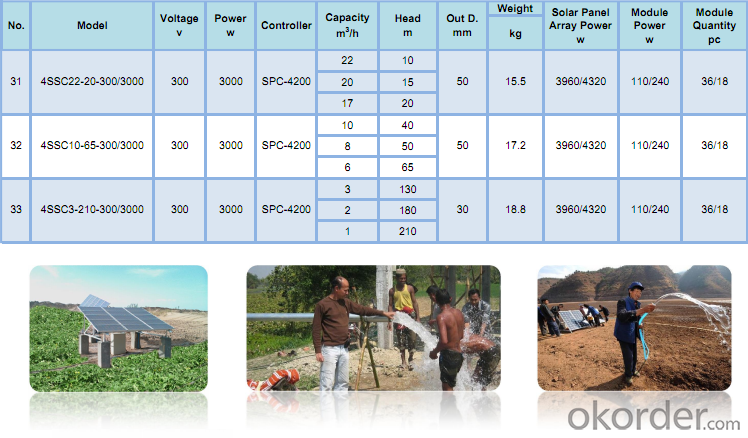
- Q: Are there any limitations on the flow rate of a solar pump?
- Yes, there are limitations on the flow rate of a solar pump. The flow rate depends on various factors such as the power output of the solar panel, the size and efficiency of the pump, and the available sunlight. Additionally, the design and configuration of the pumping system, including the size of the piping and any restrictions or obstacles in the flow path, can also affect the flow rate.
- Q: How does the quality of solar panels affect the performance of a solar pump system?
- The quality of solar panels plays a crucial role in determining the performance of a solar pump system. High-quality solar panels are designed to efficiently convert sunlight into electricity, ensuring a consistent and reliable power supply for the pump system. On the other hand, low-quality or substandard solar panels may have lower efficiency and may not be able to generate sufficient electricity to power the pump system adequately. One of the key factors that affect the performance of solar panels is their efficiency in converting sunlight into electricity. High-quality solar panels typically have a higher efficiency rating, meaning they can generate more electricity from the same amount of sunlight compared to lower-quality panels. This increased efficiency translates into more power available to operate the solar pump system, allowing it to pump water at a higher rate or maintain operation during periods of low solar irradiation. Moreover, the durability and reliability of solar panels are also critical factors in their performance. High-quality panels are designed to withstand various weather conditions and have a longer lifespan, ensuring consistent performance over time. In contrast, low-quality panels may deteriorate quickly, lose efficiency, or even fail prematurely, leading to reduced performance or complete system failure. Another aspect to consider is the quality of the materials used in the construction of the solar panels. High-quality panels are made with premium materials and advanced manufacturing processes, ensuring better resistance to environmental factors such as UV radiation, extreme temperatures, and humidity. This results in improved longevity and performance of the solar panels, ultimately benefiting the overall performance of the solar pump system. In conclusion, investing in high-quality solar panels for a solar pump system is essential to maximize its performance and efficiency. These panels offer higher conversion efficiency, improved durability, and longer lifespan compared to low-quality alternatives. By choosing high-quality solar panels, the system can operate reliably and consistently, providing sufficient power to meet the water pumping requirements even in challenging conditions.
- Q: Can a solar pump be used for pond aeration?
- Yes, a solar pump can be used for pond aeration. Solar pumps are designed to run on solar energy, which makes them an eco-friendly and cost-effective solution for pond aeration. By using the power of the sun, these pumps can circulate water and create aeration in the pond, which is essential for the health of aquatic life. Aeration helps to maintain proper oxygen levels in the water, prevent the growth of algae, and improve overall water quality. Additionally, solar pumps are easy to install and operate, requiring minimal maintenance and no electricity costs. They are a practical and sustainable choice for pond owners who want to enhance the ecosystem of their ponds.
- Q: Are there any safety measures or precautions to consider when using a solar pump?
- Yes, there are several safety measures and precautions to consider when using a solar pump. 1. Electrical Safety: Ensure that the solar panel and the pump's electrical components are properly installed and grounded to avoid electric shocks. It is crucial to follow the manufacturer's instructions and guidelines. 2. Overheating Protection: Solar pumps may generate heat during operation, especially in direct sunlight. To prevent overheating, it is important to provide proper ventilation and shading for the pump components. 3. Maintenance and Inspection: Regularly inspect and maintain the solar pump system to ensure its proper functioning and identify any potential issues. Check for loose connections, damaged cables, or any signs of wear and tear that may pose a safety risk. 4. Water Contamination: It is essential to prevent water contamination, especially if the solar pump is used for drinking water or irrigation purposes. Ensure that the water source is clean and free from pollutants. Regularly clean and disinfect the pump and its components as per the manufacturer's recommendations. 5. Installation and Mounting: When installing the solar panel, ensure it is securely mounted in a suitable location, following proper safety protocols. Avoid installing the solar panel in areas prone to high winds, flooding, or other potential hazards. 6. Protection from Extreme Weather: In regions with extreme weather conditions like hurricanes or heavy snowfall, it is important to take precautions to protect the solar pump system. This may include installing protective covers or shelters to shield the equipment from damage. Always consult the manufacturer's guidelines and consult with professionals if necessary to ensure proper installation, operation, and safety of the solar pump system.
- Q: Are there any limitations to using a solar pump?
- Yes, there are certain limitations to using a solar pump. One major limitation is that solar pumps are dependent on sunlight for their operation. This means that they may not be as effective or efficient during cloudy or rainy days, or in areas with limited sunlight. The amount of power generated by the solar panels directly affects the pump's performance, so if there is not enough sunlight, the pump may not be able to function optimally. Another limitation is the initial cost of installing a solar pump system. While solar pumps can save money in the long run by reducing electricity bills, the upfront costs can be significant. The cost includes not only the pump but also the solar panels, batteries, and other necessary components. This may make it less accessible for individuals or communities with limited financial resources. Additionally, solar pumps require adequate space for the installation of solar panels. The panels need to be positioned in a way that maximizes exposure to sunlight, which may require a large open area or a rooftop with unobstructed access to sunlight. In some urban or densely populated areas, finding suitable space for solar panels can be a challenge. Maintenance and repair can also be a limitation. Solar pumps require regular maintenance to ensure their efficient operation. This includes cleaning the solar panels, checking connections, and inspecting other components. If a part malfunctions or breaks, it may be more challenging to find specialized technicians or spare parts compared to conventional pumps. Lastly, the capacity of solar pumps can be limited. They may not be suitable for high-demand applications that require significant water flow or pressure. Larger-scale agricultural or industrial operations may require more powerful pumps that solar energy alone may not be able to provide. Despite these limitations, solar pumps offer numerous advantages such as energy efficiency, environmental friendliness, and long-term cost savings. It is important to carefully assess the specific requirements and limitations of your situation before deciding to use a solar pump.
- Q: Can a solar pump be used to pump water from a river or lake?
- Yes, a solar pump can be used to pump water from a river or lake. Solar pumps are designed to run on solar power, converting sunlight into electricity to power the pump. They are commonly used in remote areas where grid electricity is unavailable or expensive. By harnessing solar energy, these pumps can efficiently pump water from natural sources like rivers or lakes, making them a sustainable and eco-friendly option for water supply.
- Q: Can a solar pump be used in commercial agriculture?
- Certainly, commercial agriculture can utilize solar pumps. Solar pumps serve as an eco-friendly and economically viable solution for irrigation in agricultural fields. By utilizing solar energy to power the pumps, the need for electricity or fuel is eliminated. This attribute makes them especially suitable for remote areas lacking reliable access to grid electricity. For commercial agriculture, solar pumps present numerous advantages. They ensure a consistent and dependable water supply, which is crucial for crop growth and yield. Furthermore, these pumps can be easily scaled to meet the water demands of expansive agricultural operations. Furthermore, solar pumps boast low operational and maintenance costs when compared to conventional pumps. Once installed, they require minimal upkeep and have a long lifespan. Consequently, commercial farmers can significantly reduce their reliance on costly diesel or electric pumps, making solar pumps an economically sound choice. Furthermore, the adoption of solar pumps in commercial agriculture can bring about positive environmental impacts. By harnessing solar energy, these pumps contribute to the reduction of greenhouse gas emissions and promote sustainable farming practices. This aligns with the global trend towards more sustainable and eco-friendly agricultural methods. In conclusion, solar pumps are indeed applicable to commercial agriculture. They offer a dependable, economically viable, and environmentally friendly solution for irrigation in agricultural fields, thus making them a feasible option for commercial farmers.
- Q: Can a solar pump be used in cold climates?
- Yes, a solar pump can be used in cold climates. However, its efficiency may be slightly reduced due to lower solar radiation levels during winter months. Nonetheless, with proper insulation and protection against freezing, a solar pump can still be effective in pumping water in cold climates.
- Q: Can a solar pump be used for filling or emptying water tanks?
- Yes, a solar pump can be used for both filling and emptying water tanks. Solar pumps are designed to use solar energy to power the pump, allowing it to draw water from a source and fill a tank or vice versa. This makes them a reliable and cost-effective option for water management in various applications, especially in areas with limited or no access to electricity.
- Q: How does a solar pump handle water temperature variations?
- A solar pump is designed to handle water temperature variations by adjusting its operation accordingly. It can efficiently handle both hot and cold water temperatures without any adverse effects on its performance.
Send your message to us
Bird Bath Solar Submersible Water Pumps
- Loading Port:
- Shanghai
- Payment Terms:
- TT OR LC
- Min Order Qty:
- 1 set
- Supply Capability:
- 1000 set/month
OKorder Service Pledge
OKorder Financial Service
Similar products
Hot products
Hot Searches
Related keywords
